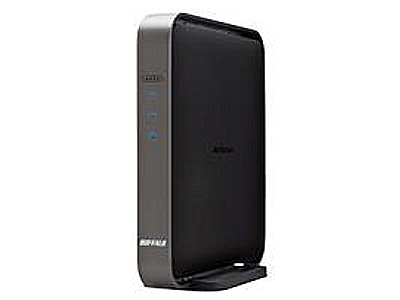Buffalo Shipping 802.11ac Router, Wireless Bridge
Following Netgear's 802.11ac entry into the networking market back in April, Austin, Texas-based Buffalo Technology is now announcing the release of two 802.11ac products of its own: the the AirStation WZR-D1800H wireless router and the WLI-H4-D1300 wireless media bridge. Both are based on Broadcom's 5G Wi-Fi chips, offering speeds up to three times faster than the 802.11n standard. Buffalo is actually claiming first to market, as Netgear's solution doesn't arrive until sometime during this half of May.
"Operating in the 5 GHz spectrum, 802.11ac offers transfer speeds up to 1300 Mbps, ideal for uninterrupted HD video streaming and concurrent Internet access," Buffalo said on Monday. "Along with gigabit speeds, Buffalo's 802.11ac products with improved radios will feature improved reliability and produce better in-home coverage for ultra-portable devices such as tablets and smart phones. As 5G WiFi proliferates into phones and tablets, the WZR-D1800H will enable even better coverage as well as incredibly fast download times, improving the battery life of clients."
Buffalo said the router integrates a class leading 2.4 GHz 3x3 802.11n radio providing backward compatibility and offering speeds up to 450 Mbps. Add that to the speeds coughed up on the 5 GHz spectrum, and users have a total aggregate wireless throughput up to 1750 Mbps. This should be ideal for family members who typically fight over bandwidth for streaming seamless video from Netflix or Hulu.
For the uninitiated, a wireless media bridge serves as a huge dual-band Wi-Fi dongle, allowing users to connect up to four Gigabit Ethernet-based devices like Blu-ray players and gaming consoles. Like the router, it features 5 GHz and 2.4 GHz radios, the former providing theoretical speeds up to 1300 Mbps. This is the ideal spectrum if the connected devices are bandwidth hogs.
Even more, Windows 7 customers could attach a Windows 7-based PC to the media bridge, install Connectify, and use that PC as a network extension for wireless devices. The only drawback is that media bridges typically create a mini-network for all connected devices, and sends/receives network requests to the router via one set IP address. This makes transferring files between the two groups a little weird. Media bridges also don't connect directly to the Internet, meaning users still need the router.
Buffalo said that both products are backed by a limited three-year warranty that includes toll-free U.S.-based technical support available 24/7. The WZR-D1800H and WLI-H4-D1300 are available now at Fry's, Frys.com and NewEgg.com at estimated street prices of $179.99 each.
Get Tom's Hardware's best news and in-depth reviews, straight to your inbox.

Kevin Parrish has over a decade of experience as a writer, editor, and product tester. His work focused on computer hardware, networking equipment, smartphones, tablets, gaming consoles, and other internet-connected devices. His work has appeared in Tom's Hardware, Tom's Guide, Maximum PC, Digital Trends, Android Authority, How-To Geek, Lifewire, and others.
-
wasabiman321 Hopefully once more of these ac routers come out toms can do some testing, really curious to see if it'll be worth it eventually to upgrade my still new wireless N gear. Hopefully some overheating shenanigans will be fixed in this generation :) Get on it Chris!!Reply -
"This should be ideal for family members who typically fight over bandwidth for streaming seamless video from Netflix or Hulu."Reply
Oh boy, I cannot wait for a 1750Mbps wireless router to fix all my streaming internet video problems. This will make my 3Mbps DSL connection fly!
To the uninitiated, to fully utilize your 5, 10, 20Mbps internet connection, a 54Mbps 802.11g is more than sufficient. The weak point isn't the local wireless speed, it's the overpriced bandwidth from cable and telephone providers who refuse to reinvest in truly high speed networks. -
willard 1jadedattcustomerTo the uninitiated, to fully utilize your 5, 10, 20Mbps internet connection, a 54Mbps 802.11g is more than sufficient.To the uninitiated, wireless networking has very large overhead, around 30% even with a very good connection. If your connection is poor, you can easily lose the majority of your bandwidth to retransmits and other WiFi overhead. Long story short, your 54 Mbps router is not providing anywhere near 54 Mbps unless you are inches from the router, and even then you'll lose some bandwidth.Reply
Multiple people sharing the network will further reduce your bandwidth, as will increasing your distance from the router, putting obstacles in the path and interference from other sources of 2.4 GHz radiation. Bandwidth overhead is sky high in most home wireless networks.
A decent 802.11n router is plenty for most applications, but 54 Mbps is not usually enough for smooth streaming of HD video over the internet. 802.11ac is of questionable value to people who already have an 802.11n network, though there are still great applications for it, like local streaming (rapidly rising in popularity with the proliferation of set top boxes), network attached storage and local file transfers. -
SVoyager +1 @ willard. Working at an ISP, I have to say these 3 paragraphs quite a few times to ppl who ain't sure what type of router they need to buy. Very good explanation!Reply -
razor512 hopefully this gets benchmarked.Reply
On my dual band N600 router, and my 450mbit dual band (intel ultimate n) wifi card, 1 foot away = a little over 120mbit/s transfer speeds, (not very close to N450 or N600 speeds)
I would like to know if this new wireless technology will repeat the fail that is demonstrated in the small net builder wifi charts -
TeraMedia Sticking with my full-duplex jumbo-frame CAT6 GbE network, and wishing CAT6a had been out when I built my house. I do use WiFi, but not for streaming video. And not for connecting file/media servers or HTPCs. If anything, I'll get an -11ac AP when I want less interference from neighbors impacting my BW.Reply -
mayne92 Had nothing but problems from 3 different manufacturers with their routers when 802.11n first came out still in draft. Not jumping on the bandwagon this time around.Reply
